from Instagram

from Instagram

from Instagram
Wake up, Larry.
At 7am this morning an autonomous action gathered on the front lawn of UPenn President Larry Jameson to wake him up from his comfortable slumber as he allows the university to fund Israel’s genocide against the Palestinians through investments and providing shelter and resources to Ghost Robotics and the GRASP labs which industrialize the mass extermination campaign.
Submission
🤖🐶
It is unclear what the struggle for Palestinian liberation will look like in the coming days. At the time of this writing a ceasefire has just been reached between Hamas and the Zionist entity, at the same time the Zionist entity continues to devastate Gaza and the West Bank. Last year a specific struggle against a local technology company connected the dots between Palestinian liberation, local gentrification, education, militarism, and borders. The company in question, Ghost Robotics, has come under fire for creating robot dogs used by the Israeli Defense Forces. That struggle may well be ongoing and this zine is not meant to push struggles into the safety of history, its aim is to inspire revolt, specifically against Ghost Robotics and generally against all aspects of domination. The struggle against Ghost Robotics has taken many forms, from spreading information and popular education, to organizing demonstrations, to destroying property. By reflecting on the past struggles we can better imagine and carry out our struggles today. This zine brings together writings about Ghost Robotics, a timeline of publicly documented action against Ghost Robotics, communiques from anonymous actions, a few photos. All information is taken from sources listed in the Resources section at the end.
Philadelphia, Occupied Lenapehoking,
Winter 2025
[PDF] [PDF For Printing]
Submission
skip your boring ass lecture to come meet some rowdy punks ready to challenge the university in its entirety. I promise you we’ll learn more from each other than we ever did in class. leave the classroom – or better yet, drop out – and come join us in clark park near the chess tables @8pm every sunday (beginning dec 1st)
“Drexel is John Fry threading his way thru underpaid Aramark workers in the mot expensive suits money can buy. Penn is the enforcement of exclusionary elitist ideology. Temple is the ongoing gentrification and displacement of Black people in North Philly. The University, all over the globe, is the repression of student dissedents and the proliferation of the capitalist death cult that kills us all.”
DEC 1st READINGS: Welcome to NYU – by some student anarchists in the 1960s
Arrival Survival – by Filler Distro, 2015
(readings also available in print at discussion)
from Mainstream Media
Residents of the house said a cell phone was taken and that the search warrant was issued in connection to a recent vandalism.
University of Pennsylvania police officers raided the off-campus home of several Penn community activists last week in connection to an alleged act of vandalism — a move that has deepened scrutiny into the Ivy League institution’s handling of dissent over the war in Gaza.
Around 6 a.m. on Oct. 18, residents said a dozen armed campus officers stormed their West Philadelphia home in tactical gear, corralling the pajama-clad residents at gunpoint. People who live in the house said police brought one resident, whom they did not identify, to the station for questioning and that their “personal device was seized on suspicion of vandalism.”
While no one has been charged or arrested, the group described the search as an unprecedented and “traumatic” show of force against pro-Palestinian activists on campus.
“This is a disgusting escalation from the University, and comes after a year of disciplining, arresting, and brutalizing their own students who organize for Palestinian liberation, and they made the deliberately traumatizing and threatening decision to invade our home,” the house residents said in a joint statement. The group provided written answers to The Inquirer, but declined to be individually identified as they have not been charged and feared further reprisal.
Penn police confirmed that officers executed a search warrant on Friday in connection with a vandalism incident, but did not specify details about the case or the underlying vandalism. Penn police defended the action by saying that, in the last four months, the university has experienced about a quarter million dollars in damages from vandalism, including broken glass and graffiti.
“Any legal action taken by the UPPD is based on the violation of laws in the Commonwealth of Pennsylvania, not the policies of the university,” said Kathleen Shields Anderson, vice president of Penn’s division of public safety.
While Penn did not elaborate on the alleged vandalism, the search warrant nonetheless marks an escalation in the school’s handling of the fallout from the war overseas. It also comes at the time when the university faces pressure to crack down on antisemitic speech as well as activity critical of Israel on campus. Meanwhile, pro-Palestinian student protests over the war continue to roil the campus and administers over what activists describe as biased and uneven treatment.
Penn police did not provide a copy of the warrant and the record has yet to be filed with the courts as of Thursday, meaning details of the investigation may remain unclear unless or until charges are filed.
A spokesperson for District Attorney Larry Krasner confirmed that the prosecutor’s office approved the search warrant based on an ongoing investigation led by Penn police. If the search leads the university to pursue criminal charges, the district attorney “will carefully review the evidence submitted by the appropriate law enforcement authorities and make a fair and just determination,” said spokesperson Dustin Slaughter.
It was not clear where the off-campus house was located nor how many people live there. The group described themselves as “members of the Penn community,” of varying ages.
Last week, Penn police and Philadelphia police officer entered the home, awoke the residents and moved the group into the living room “at gunpoint,” the group said in a statement. The Philadelphia Police Department declined comment and deferred questions to Penn police.
Residents described the early-morning sting as “the most severe act of university repression of pro-Palestine activism since last October” as well as “a staggering show of force unheard of at any other university.” The group said it has consulted with lawyers.
Anderson maintained that throughout the execution of the warrant, officers “took care to explain to all involved what was occurring and to treat them with respect.”
As with other campuses, vandalism has been a routine flashpoint at Penn since the Oct. 7 Hamas attacks on Israel, with messages calling for “Ceasefire” or “Free Gaza” scrawled on campus buildings across the region. Penn has been the site of a concentrated — and controversial — series of defacements, including several incidents within the last month alone, according to the student-run Daily Pennsylvanian.
More vandalism occurred this week, including one that said “Kill Zios” and another that said, “KILL YOUR LOCAL ZIO NAZI,” the student newspaper reported Thursday.
In July, doors and windows were damaged at the Pennovation Center, which houses the company Ghost Robotics, which is involved in the production of equipment used by the military and which critics have targeted in the wake of Israel-Hamas war.
But on a large, urbanized campus, few vandalism cases result in exhaustive police investigations, let alone warrant executions.
Yalile Suriel, an assistant professor at the University of Minnesota who studies higher education and the militarization of campus police forces, said such departments only began conducting search warrants in recent decades, as universities dramatically expanded their law enforcement footprint. Many university departments now serve as supplemental extensions of the local police department — but often with less accountability.
“Unlike state institutions, where at least there is a sense of transparency and public record, private institutions and their police operate largely away from public view,” she said.
Suriel said that most high-profile raids that make the news involve narcotics on campus, though she could not recall another case like this focused solely on vandalism.
Public outcry over the raid has grown in recent days — with some describing the raid as a gratuitous show of force considering the nature of the alleged crime.
State Rep. Rick Krajewski, who represents parts of West Philadelphia, called it “completely unacceptable and disturbing that a dozen officers armed with tactical gear and assault rifles threatened the safety of unarmed young people who are not only students, but our neighbors.”
from Unity Of Fields
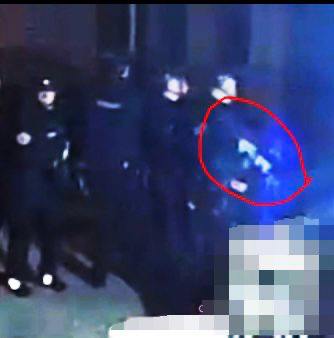
The pigs are trying to scare people into obedience to the genocidal US war machine. Do not let them. We must become more bold, more audacious tacticians, more unified amongst revolutionaries…more uncompromising.
We cannot bow our heads and accept this or throw out radicals in an attempt to save our own skins. The hammer of the state can and will come down on any of us. We only get out of this together, as revolutionaries…not fractured, separate, weak, and reformist.
Even if it’s unlikely right now, it’s good practice for *all* of us to prepare for the possibility of raids, detainments, increased surveillance, subpoenas, etc – find educational resources at unityoffields.org
Source: Penn Freedom School for Palestine
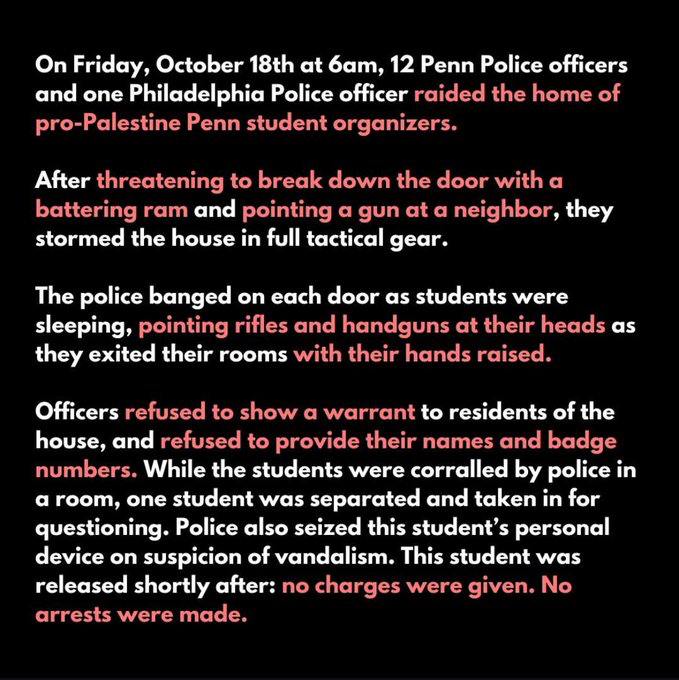


from Idavox

Freedom of speech does not mean freedom from consequence. Amy Wax is out after years of racist demagoguery.
PHILADELPHIA, PA – The University of Pennsylvania published a public reprimand against racist professor Amy Wax announcing her suspension from teaching for a year and other sanctions. This comes less than two months before she is scheduled to speak at this year’s American Renaissance (AmRen) Conference, a White Supremacist event organized by Jared Taylor, the publisher of American Renaissance who Wax had invited to speak at the university last year and has done so again for her classes this December.
“The Board recommended sanctions including a one-year suspension from the University at half pay; the loss of your named chair; the loss of summer pay in perpetuity; the requirement that you note in public appearances that you speak for yourself alone and not as a University or Penn Carey Law School faculty member; and a public reprimand,” Provost John L. Jackson wrote in the reprimand to Wax, which cited a history of not just making derogatory generalizations about groups by race, ethnicity, gender, sexual orientation, and immigration status but also in doing so breaching the requirement that student grades be kept private. An example of this was a 2017 interview with Brown University professor Glenn Loury a prominent Black conservative who regularly places the blame on Black people for racism leveled against them, she claimed Black students practically never graduate at the top of their law school classes. “I don’t think I’ve ever seen a Black student graduate in the top quarter of the class, and rarely, rarely, in the top half,” Wax, who has often attributed this observation to genetics, said on his show. In 2018 citing this statement and claiming that it was false, Dean Ted Ruger barred Wax from teaching mandatory first-year law courses. The next year, Wax spoke at the Edmund Burke Foundation’s National Conservatism conference in Washington D.C. and declared while discussing a immigration policy that favored European nations over others that she agreed with Donald Trump’s description of non-European countries as “shithole countries,” argued for a “cultural distance” approach to immigration that “preserves the United States as a Western and First World nation,” and that “our country will be better off with more whites and fewer nonwhites.
Wax particularly stoked anger on campus by inviting Jared Taylor, himself a eugenicist who believes in the inferiority of Black persons to Whites, to speak to her classes in 2021 and 2023. During last year’s invitation, Wax photographed those protesting the event as Taylor disparaged the students assembled against him. According to Philadelphia Magazine, Taylor was invited by Wax to speak to her class in December but due to her sanction it is not known if this will still take place. Wax meanwhile will be speaking during the AmRen conference Nov. 15-17 at Montgomery Bell Park Inn in Burns, TN. The conference, which was attended by organizers of the tragic Unite the Right rally in Charlottesville two weeks before that event and promoted there, has seen a decline in numbers in recent years even though they have featured more prominent figures such as former House Rep. Steve King, former columnist Michelle Malkin, Laura Loomer, a neo-fascist podcaster recently seen in the company of Donald Trump, and this year Anthony Cumia the onetime radio host best known for his “Opie and Anthony” program.
Upon hearing of the sanctions imposed on Wax, Taylor angrily ranted on his podcast, saying it sent a bad precedent. “What has happened to Professor Wax is absolutely disgusting and lamentable and who knows? Maybe she will sue!” Taylor also complained that none of the news articles he read on her case noted her upcoming AmRen conference address. Meanwhile, members of Penn’s Black Law Students Association, regarded the sanctions an “overdue step” but “far from sufficient.” The group called on the administration to fire Wax and ban Taylor from campus. It is indeed rare to punish a tenured faculty member, this being the first such occurrence under Faculty Senate processes in at least 20 years.
Wax is slated to participate on a panel this Saturday in McLean, Virgina at the fall meeting of the Philadelphia Society alongside Trump-appointed Judge David J. Porter of the U.S. Court of Appeals, Helen Andrews, editor at Pat Buchanan’s American Conservative, who once wrote a fluff piece about eugenicist Steve Sailer, and J. Joel Alicea a law professor at the Catholic University of America.
Submission
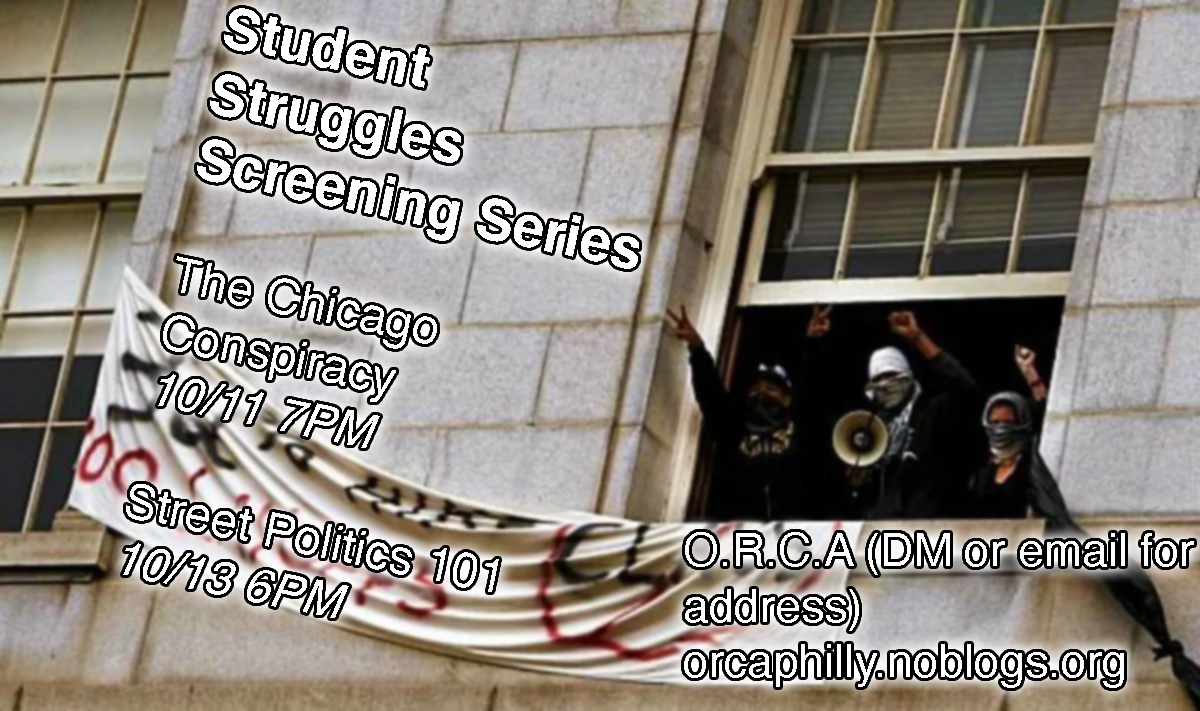
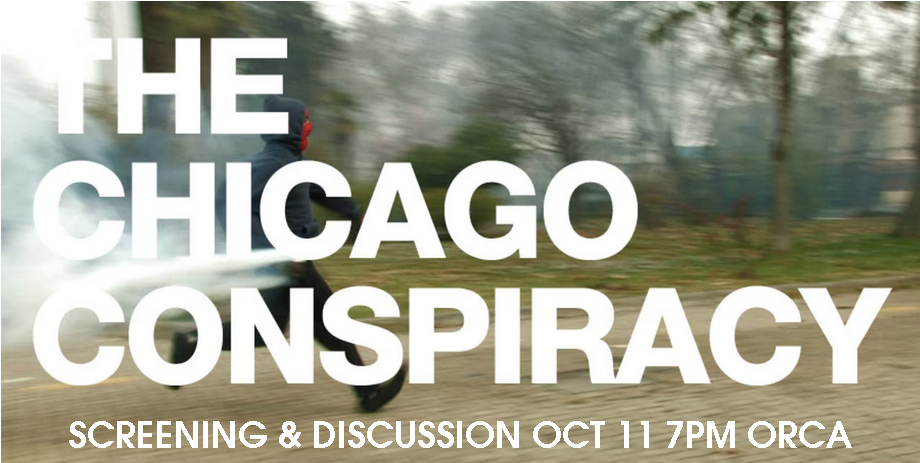
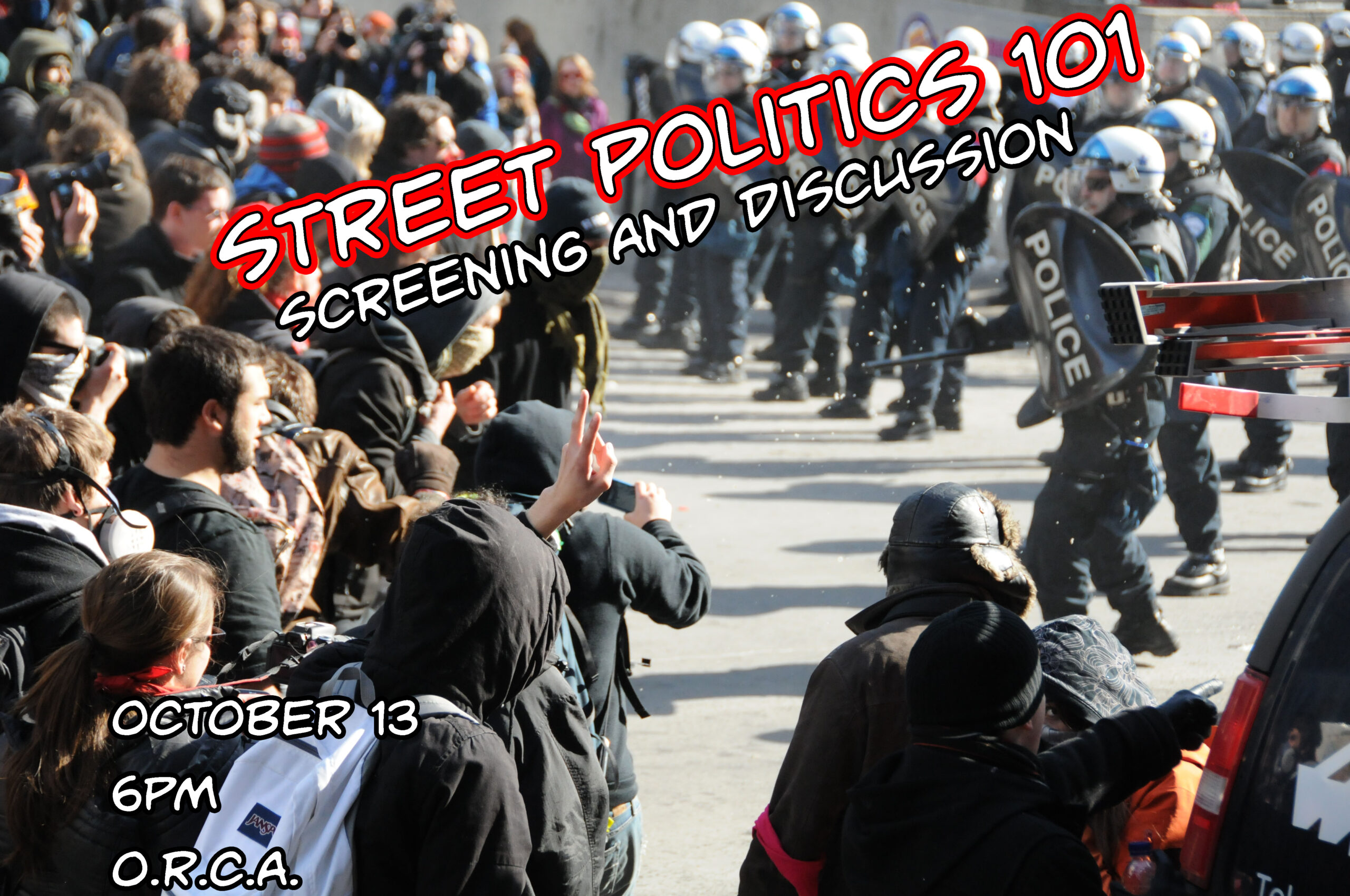
from Instagram

🇵🇸 UPENN IS COMPLICIT IN THE PALESTINIAN GENOCIDE
At the heart of campus, the Benjamin Franklin Statue stands proudly as a symbol of imperial violence and colonialism.
This morning, an autonomous group poured red paint over the statue: a visual reminder of the over 186,000 martyrs and the university’s complicity in genocide.
The University has tried to supress the student intifada, supressing Palestinian voices, all in the name of “campus safety.” There are NO Universities left in Gaza. There are NO first days. The education system of Gaza has been systematically destroyed, and the genocide has only expanded.
DISCLOSE. DIVEST. THE STUDENTS WILL NOT STOP, THE STUDENT MOVEMENT WILL NOT BE STOPPED. UNTIL PALESTINE IS FREE.
Submission
In the early hours of July 9th we smashed every window of the entrance to the Pennovation center, a ritzy research compound in Philadelphia. The lone security guard must have been so surprised when we appeared out of nowhere and started smashing, because he didn’t even try to stop us! And we couldn’t believe how long it took for the police to show up…
The Pennovation center is home to Ghost Robotics, a company that manufactures so-called “robot dogs.” Israel has been buying these robot dogs for $150,000 apiece and using them in their ongoing extermination of Palestinians. While the University of Pennsylvania continues to enable the research and manufacture of these weapons, Israel has destroyed every university in the Gaza strip, and continues to bomb schools where Palestinian refugees are taking shelter. Breaking windows is a small retaliation, but every time we act emboldens us.
Until Palestine is free, and even then, we will never stop!
from Unicorn Riot
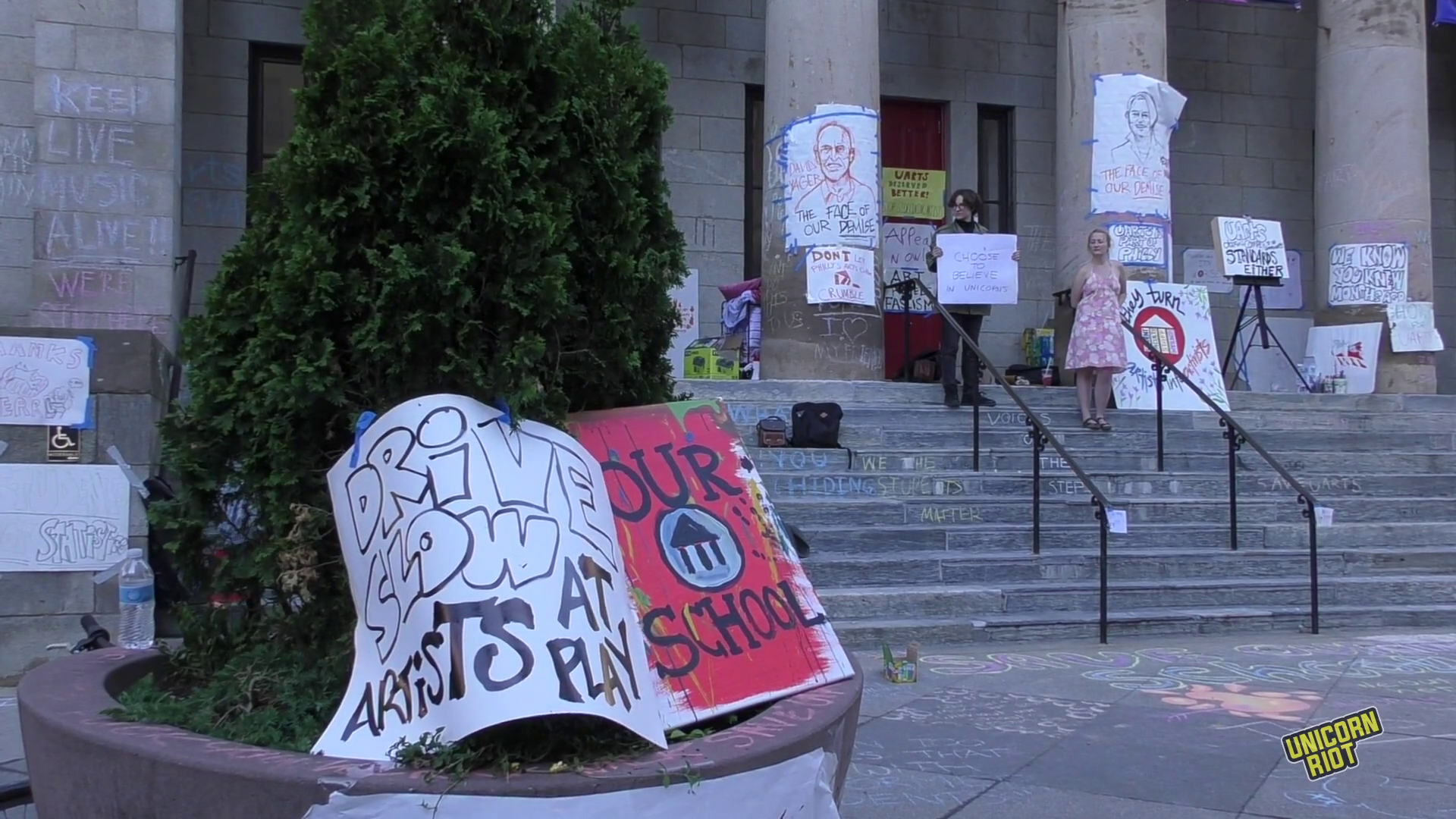
PHILADELPHIA, PA — Center City’s premiere arts university abruptly announced it’s shutting its doors, sending the entire community scrambling. Its accreditation was also pulled amid claims that a multi-million dollar budget gap had suddenly emerged. Some students assembled on the morning of June 4 to read demands:
Also the massive downtown real estate holdings are another subject of interest. Other nearby students have protested recently at UPenn and Drexel over Palestine divestment.
from Unicorn Riot
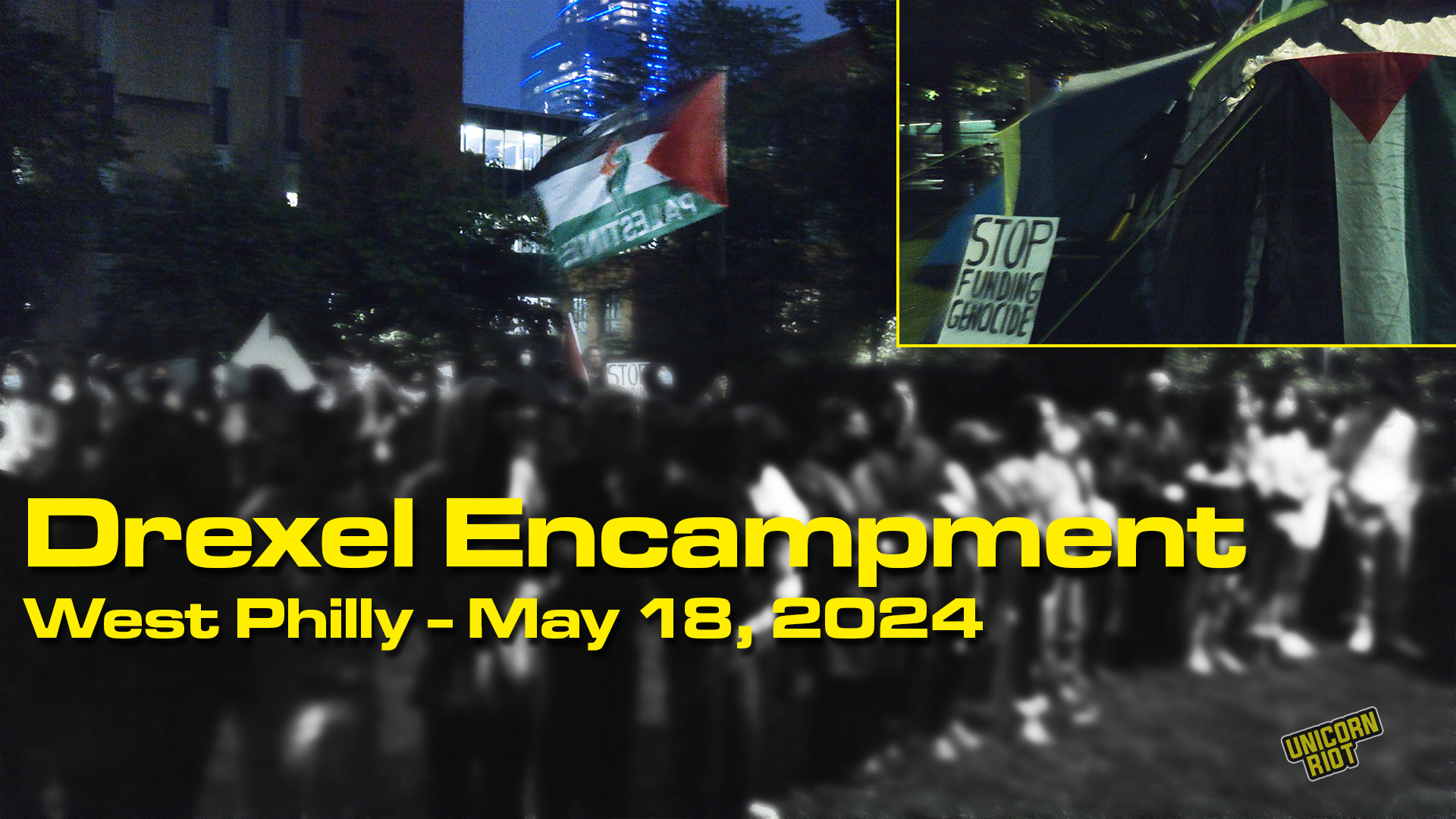
Philadelphia, PA — Students at Drexel University established an encampment in support of divesting from Israel on May 18, following a rainy Nakba Day commemoration march from Center City that started around 4 p.m. Philadelphia and Drexel police officers quickly surrounded the encampment with a ring of metal barricades and largely barred additional people from entering; this was apparently at the orders of Drexel’s campus police chief.
There was a brief struggle over the metal barricade components, and at one point an officer brandished a Taser at the crowd but was pulled back by another, shortly after our reporters got onsite. As of late Monday the encampment was still in place.
Our livestream from inside the barricade ring ran for almost 3 1/2 hours until shortly before midnight Saturday (YouTube). The night before, nearly 20 demonstrators were arrested just blocks away at the UPenn campus which we also streamed live. Students and other observers we interviewed discussed everything from Philly’s protest culture and law enforcement practices to the Samidoun Prisoner’s Solidarity Network. Full livestream:
In a tense confrontation at the beginning of the stream, Philly officers in riot gear wearing “Counter-Terrorism Operations” badges briefly assembled inside the perimeter but withdrew.
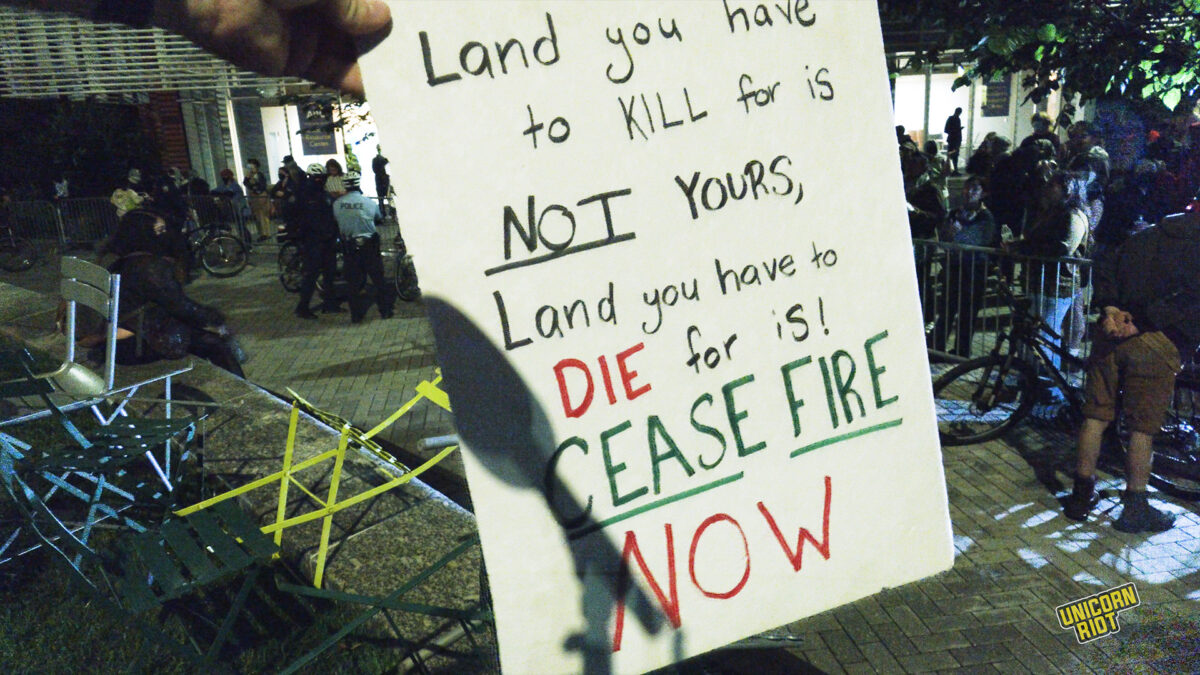
In interviews on-site students said that they were pushing to get Drexel to pull its investments from BlackRock, which does business with Israel, as well as other divestments. They also said that Drexel administrators have claimed it is illegal to disclose specific investments, but this is apparently not illegal at all. The Drexel Palestine Coalition has a list of demands posted online.
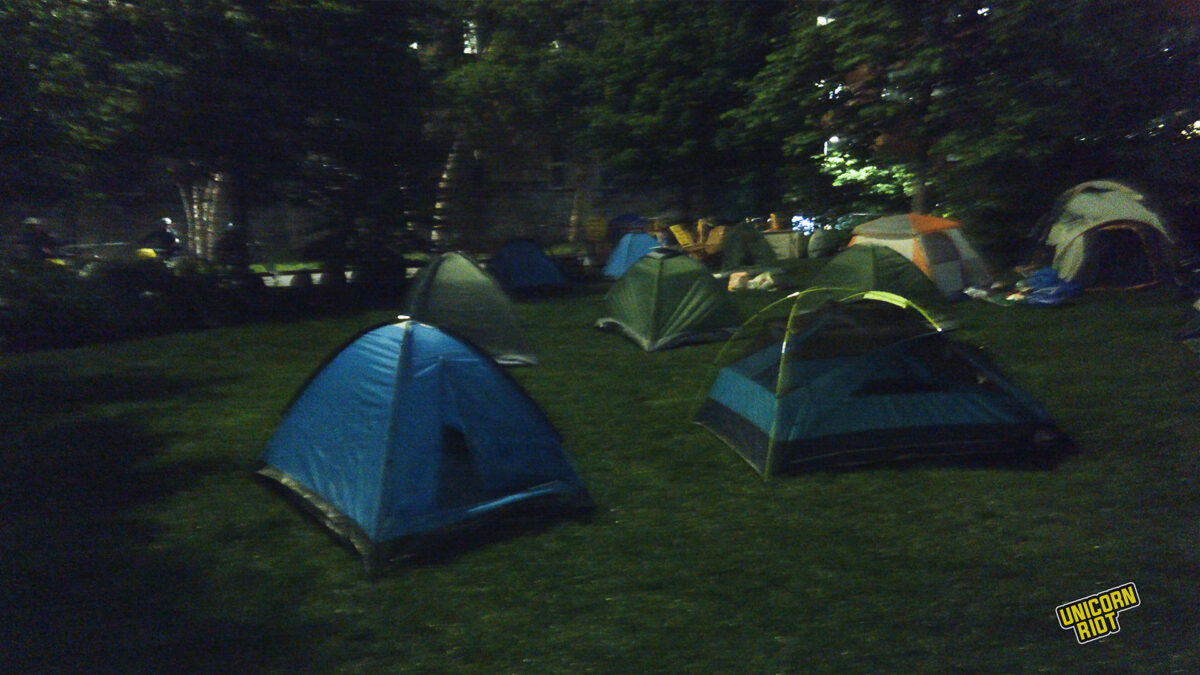
Drexel announced that it would switch to online learning for Monday.
During late Saturday night, police were largely a static presence while dozens of students milled just outside the perimeter discussing politics and playing music. A lengthy know-your-rights training with Up Against the Law and National Lawyers Guild members also took place with most of the camp participants.
Camp supporters regularly handed supplies including stacks of pizza, large tent structures and medic supplies over the barricades without much interest from the police. A Unicorn Riot reporter stuck around until the morning as a police sweep seemed possible (UPenn’s encampment was cleared in an early morning maneuver).
While the encampments might seem like a typical exercise in campus politics it should be noted that these activities are regarded as a strategic threat to Israel because they could shift the intellectual climate in the United States, which is Israel’s main international patron. A series of articles by James Bamford in The Nation has shown that groups like the Israeli-American Council and Canary Mission are closely coordinating with Israeli government agencies to crush student protests in the United States by harassing protesters.
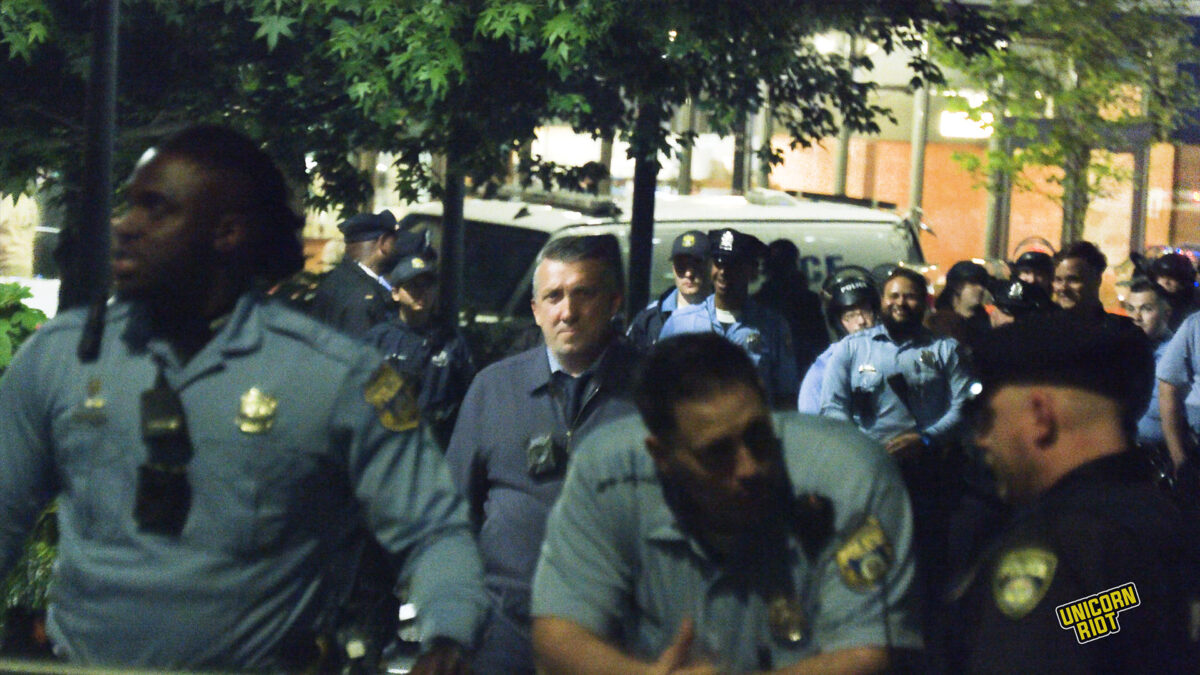
After the shocking events at Kent State and Jackson State, in September 1970 President Nixon’s Commission on Campus Unrest, chaired by Pennsylvania Governor William Scranton, dropped its report (418 page PDF). One result was the rise of campus police departments.
As the Penn Disorientation Guide outlines, police forces multiplied during the campus crackdowns of the 1970s, until today:
“If you walk west down Market St. from 30th St. Station, in 1.5 miles you pass through the jurisdictions of six police departments: Philadelphia, Amtrak, SEPTA, Penn, Drexel, and Philadelphia Housing Authority (PHA).”
Campus police in this side of the city (Drexel & UPenn) have demarcated “patrol zones” which extend into the city.
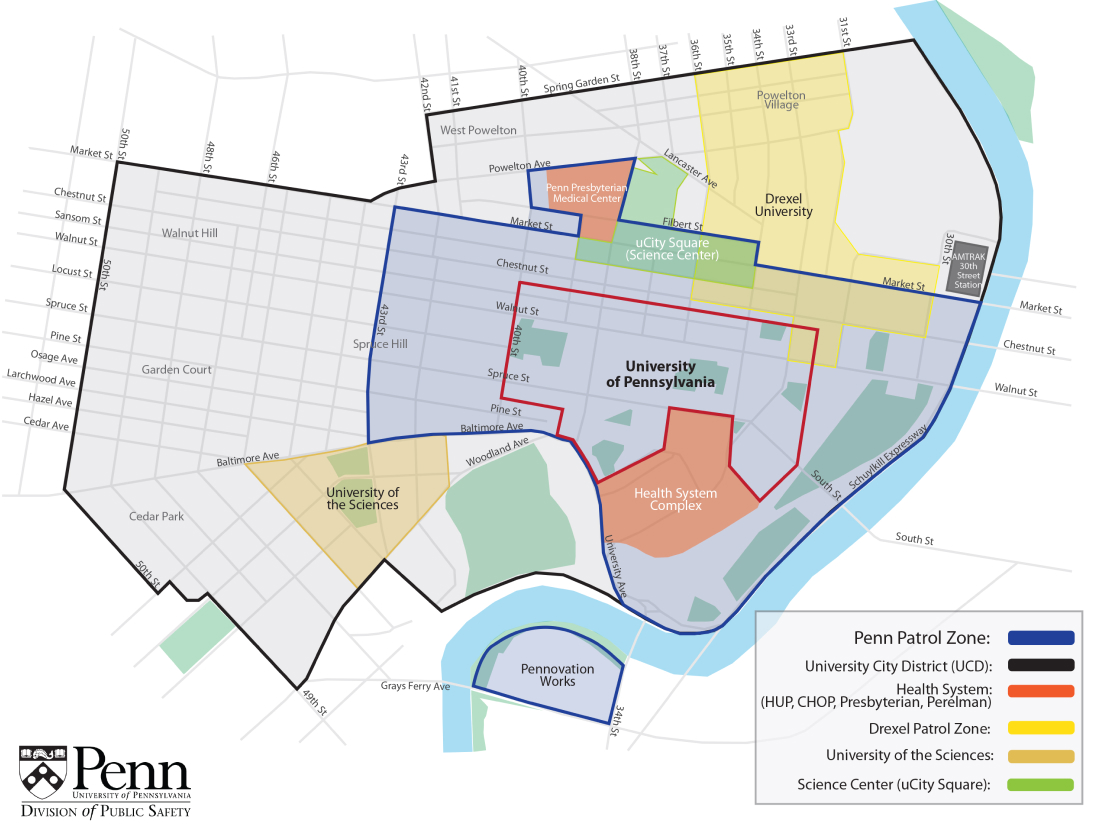
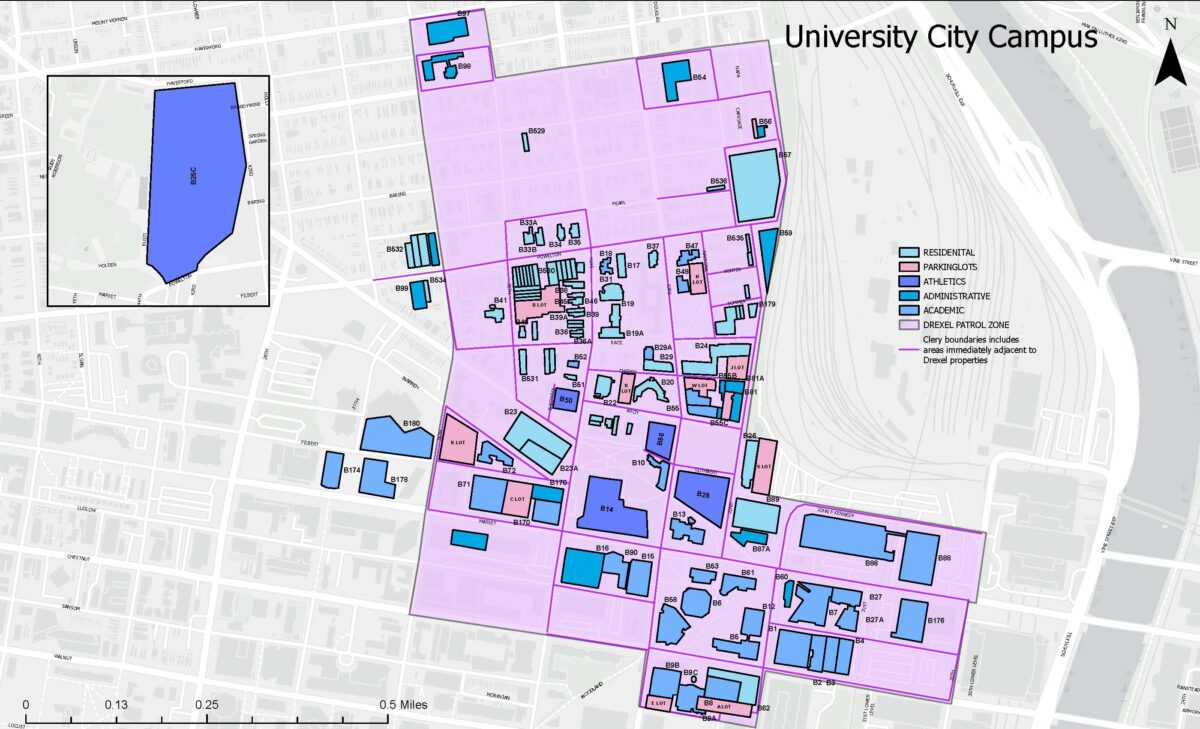
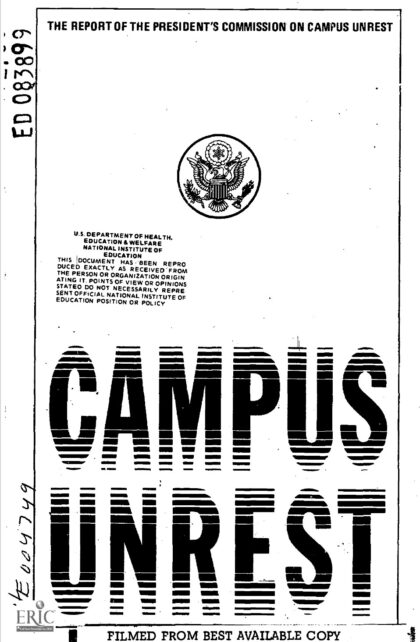
Related: UPenn Students Arrested at Palestine Demo After Building Occupation Attempt [May 18, 2024]
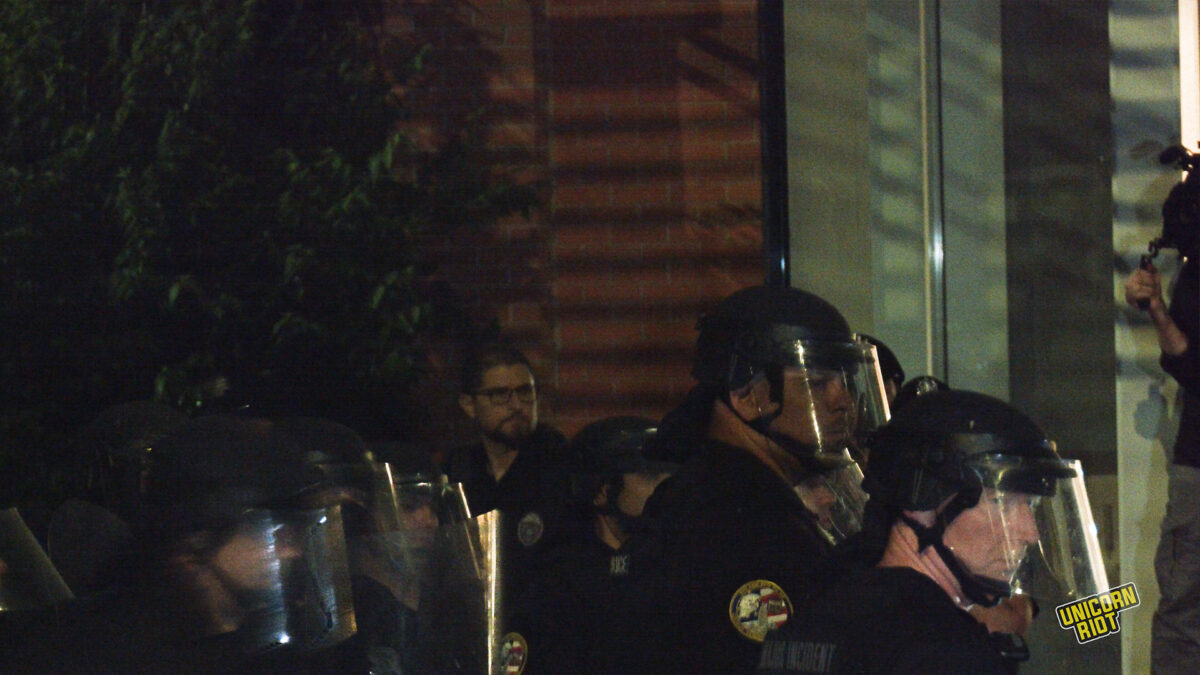
Social media clips and camera operation in latter sections of the livestream by Chris Schiano.
Submission
At approximately 7pm on Saturday May 18, and one day before the birthday of Malcolm X, a Nakba Day rally and march ended in protestors and students spontaneously setting up an encampment at Drexel University, at Academic Quadrangle. Immediately, more than a hundred protestors locked arms to defend the students. This was the second pro-Palestine protest in two days, Friday’s action having ended in several violent arrests by the Philly Pig Department (PPD) in a similar attempt to occupy a space.
Shortly after, the resilient encampment defenders began jotting down phone numbers (on their arms) for attorneys, civil rights groups, etc.
Of course, PPD wasted no time calling in reinforcements by the barn-load, a few of them already decked out in riot gear, reminiscent of the genocidal IDF. It should then come as no surprise to learn that Amerikkkan cops receive training from their Zionist buddies in Isntreal.
As the sun went down, the pigs moved in. Several encampment defenders and even legal observers were threatened with a taser by an angry member of Philly’s “finest”; one of his partners yanked him backward before he pulled the trigger. There were several other minor altercations as well.
One can’t help but notice how the violence at protests and encampments begin and end solely with the brownshirt jackboots of the State. From capitalist cops to so-called “proletarian cops,” the role of all law enforcement has been the protection of private property and defense of genocide and colonialist supremacy since the days of Amerikkkan runaway slave patrols.
At the time of writing this, the encampment is ongoing and needs support. Philly Palestine Coalition on Instagram (@phillypalestinecoalition) will be providing updates for mutual aid, jail support, etc.
To fellow anarchists, we urge you more than anyone to show up. Bring food, water, clothes, zines, but more importantly, bring YOURSELVES. Support our comrades in the streets and the encampments. In order to live in a better world, we need to create a better world. No party will save us or bring the revolution. As one protestor continuously remarked, “We protect us.”
Anarchy is forever.
Death to the zionist state.
From the sea to the river, Palestine will live forever.
Submission
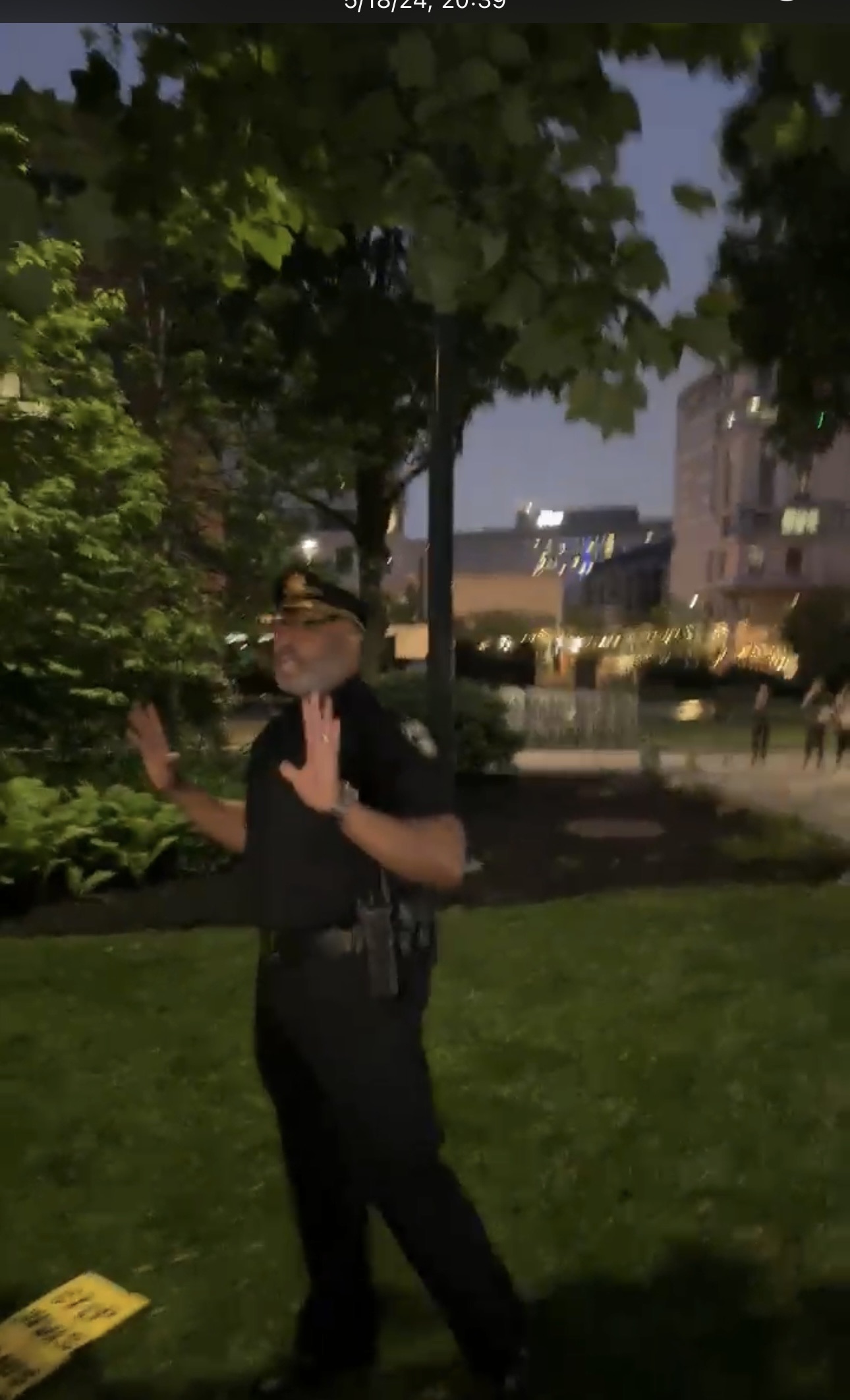
from Unicorn Riot
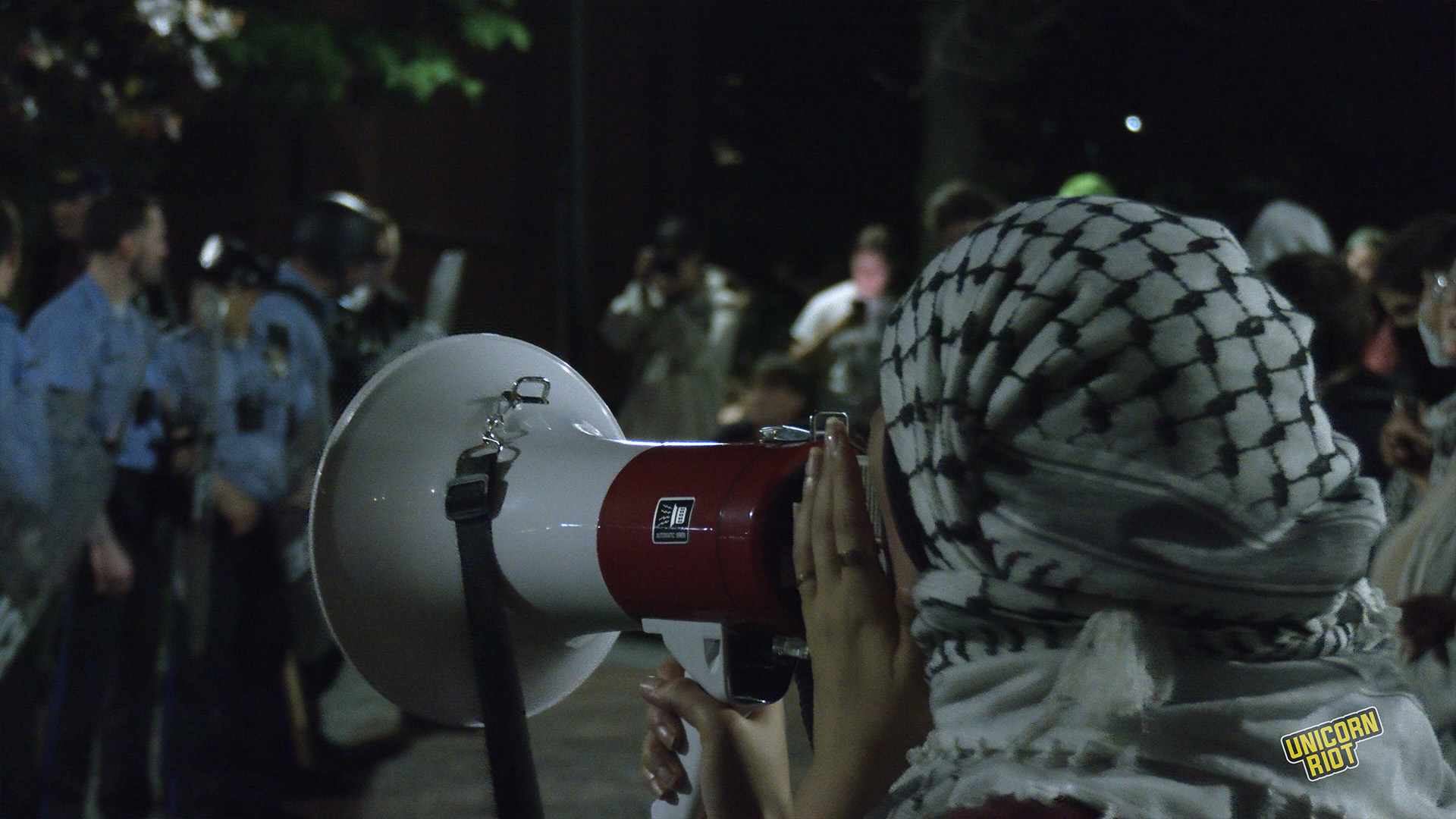
Philadelphia, PA – Nearly twenty University of Pennsylvania students and supporters were arrested after briefly occupying Fisher-Bennett Hall along 34th Street Friday night. Officers including UPenn’s Emergency Response Teams worked to shove hundreds of pro-Palestine demonstrators away from what they renamed Refaat Alareer Hall. (Alareer was a prominent Gaza professor killed by Israel late last year.) UPenn has also been a site of rallies against Ghost Robotics, an incubator spinoff company that has fast become a key world supplier of military robots including for Israel. We heard that the action was an extension of the UPenn protest encampment organizing that was swept by police action a week earlier, and was aimed at forcing UPenn to divest from companies that do business with Israel.
Philadelphia, UPenn, Drexel and SEPTA Transit Police were all activated during the evening’s events, and the Philly PD “Counter-Terrorism” team which often shows up at demonstrations was also spotted.
According to student reporters UPenn Police were seen with evidence bags at Fisher-Bennett.
Unicorn Riot was live for much of the street demo on 34th Street and after. Full live video stream (YouTube):
Legal observers and other members of the media were shoved away from the scene; approximately 18 people were arrested; at least two people were reportedly tasered, however this is not confirmed.

UPenn cleared the Palestine solidarity camp a week earlier; a similar action at the University of Chicago on Friday led to the occupation of the Institute of Politics building.
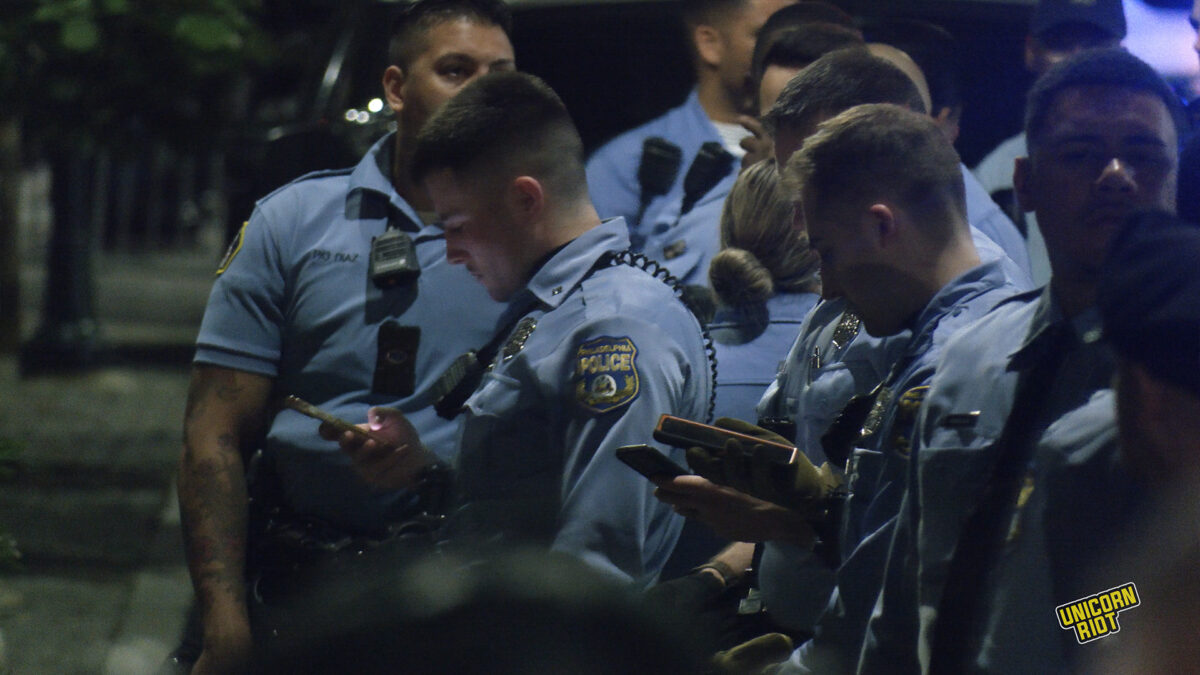
Law enforcement largely controlled 34th Street most of the time.
The arrival of another set of demonstrators on the west sidewalk after it had already been cleared, brought cheers from the crowd:
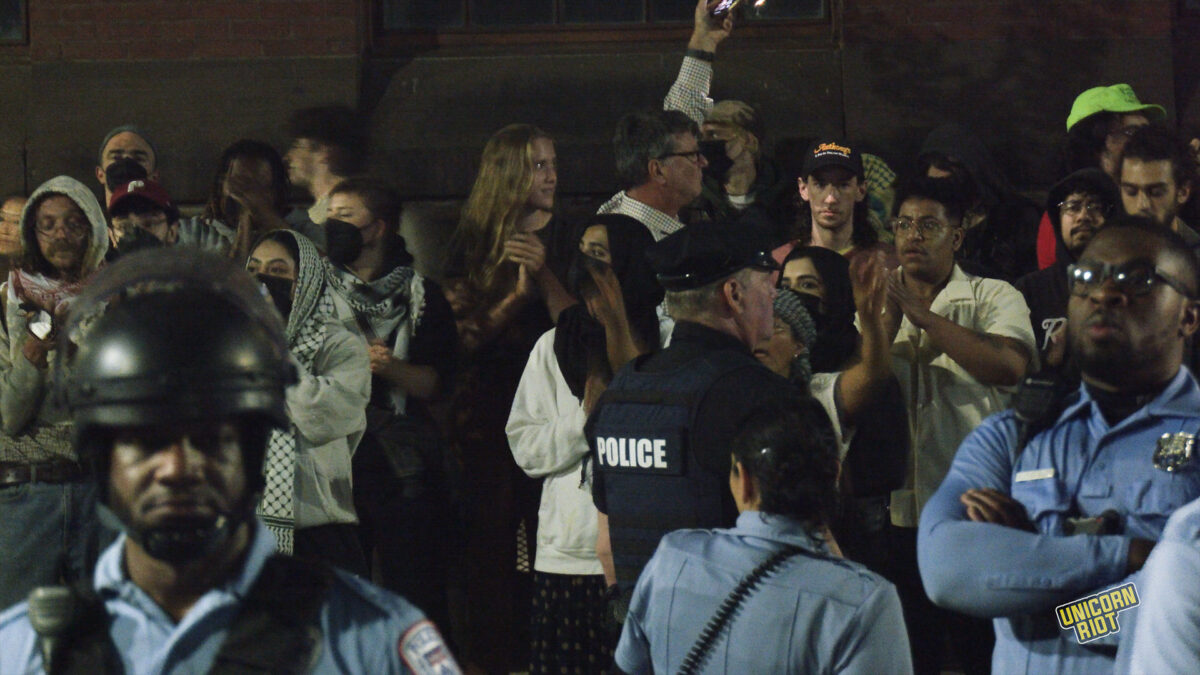
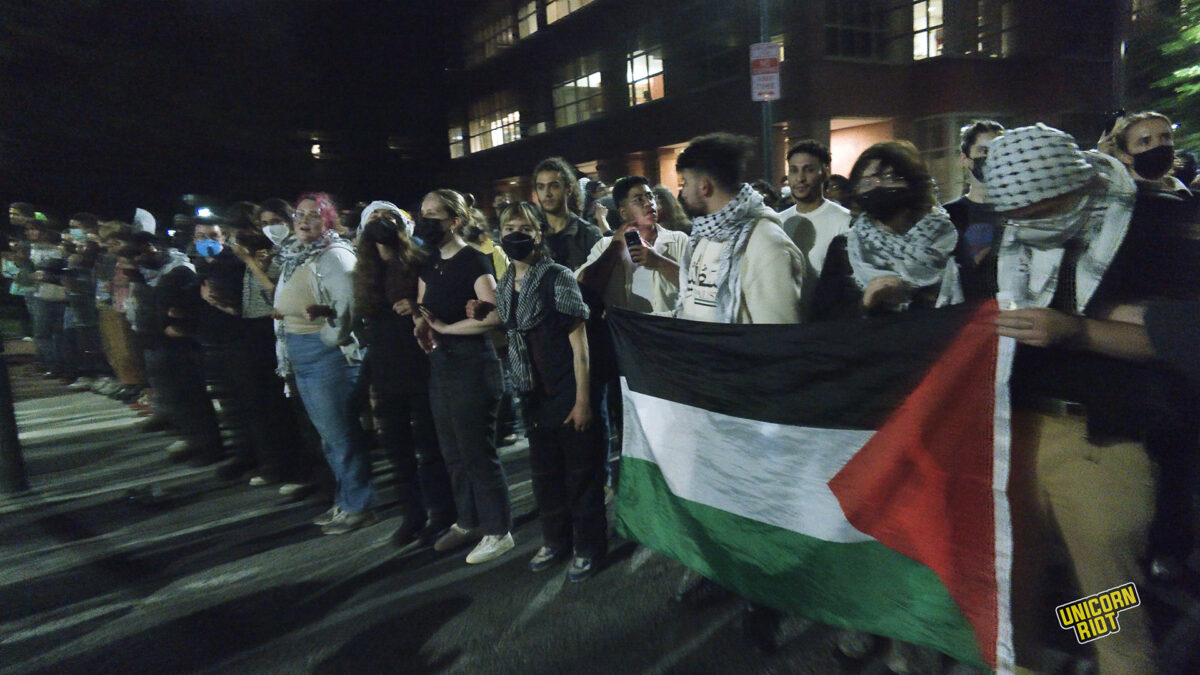
The police moved their lines south in a couple steps away from the hall and tried to isolate the crowd onto the east sidewalk. However, the crowd took 34th Street then, moving quickly, turned east onto South Street and down to the Penn Museum alumni weekend event.
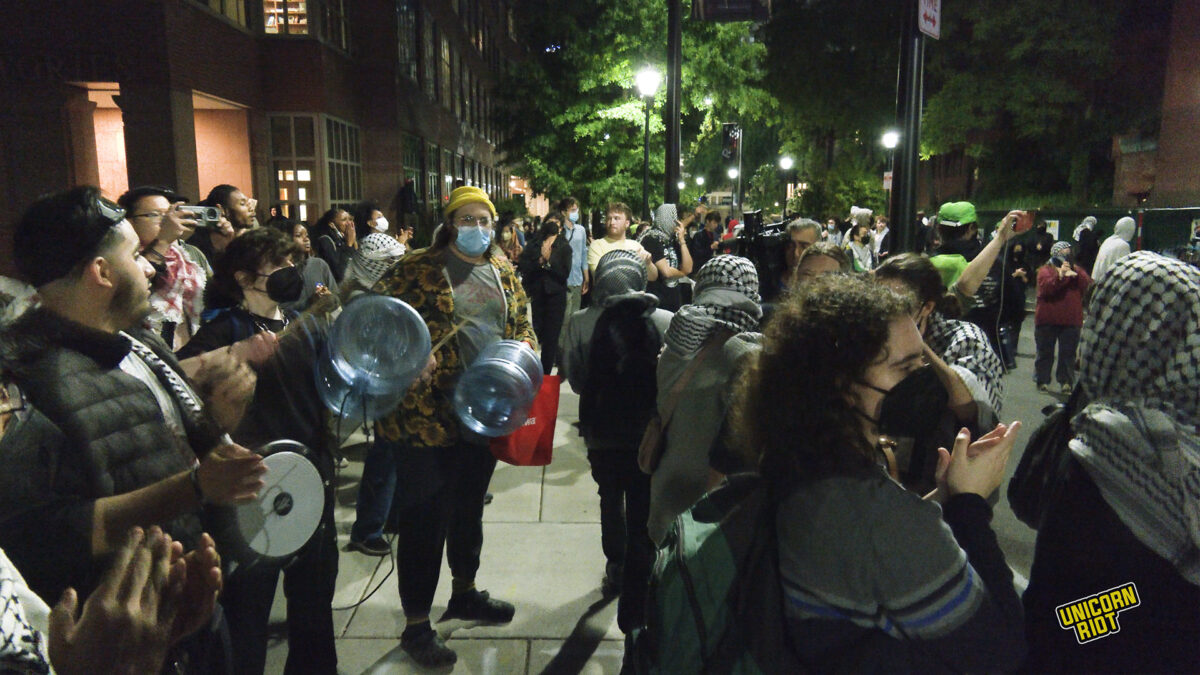
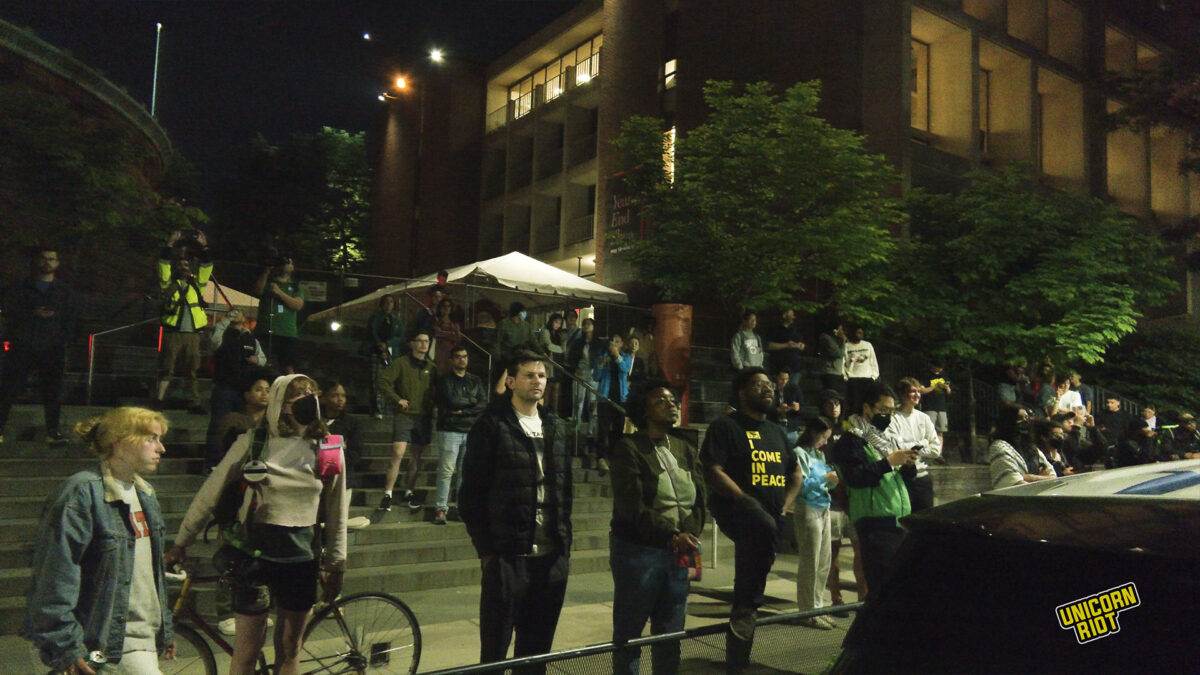
The vast majority of officers didn’t seem to tail the demonstrators to the museum — showing the utility of cat-and-mouse moves that are difficult for burdened police units to match. (This is one reason the cavalry-like mobile field force program continues to be America’s leading, standardized anti-protest planning template — it is designed to get ahead of, and split up, quick protest formations.)
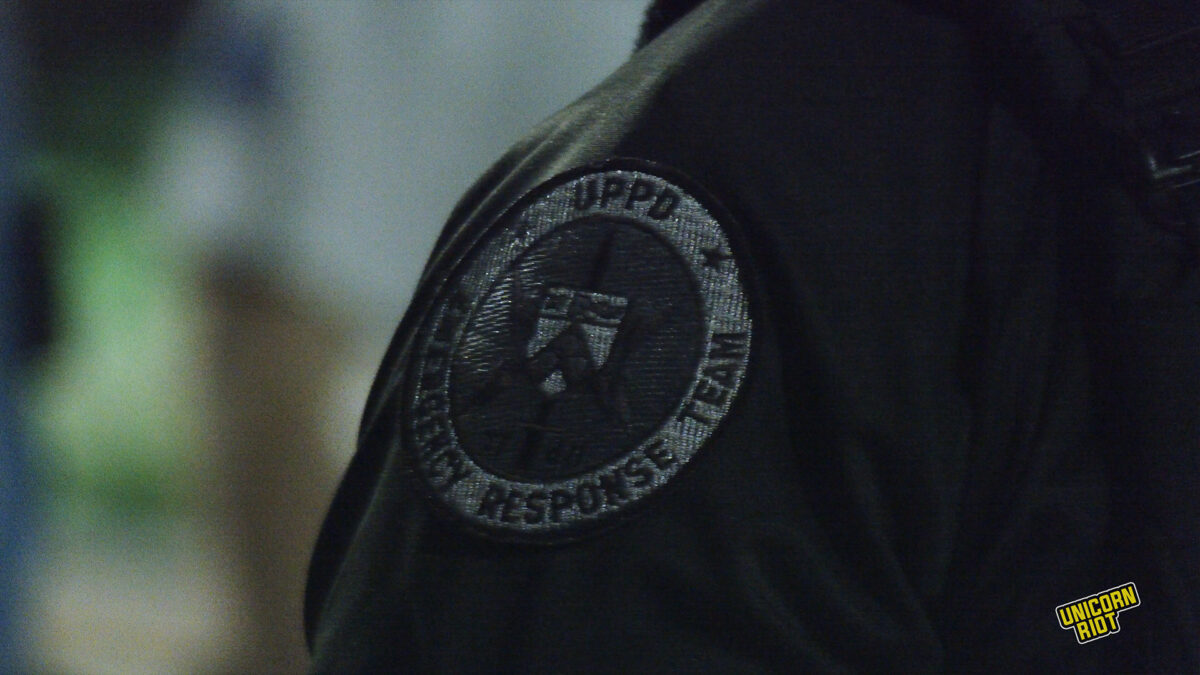
Besides the UPenn Emergency Response Teams, SEPTA Transit Police, and Drexel campus police also activated. A Drexel officer was spotted assembling zipties.
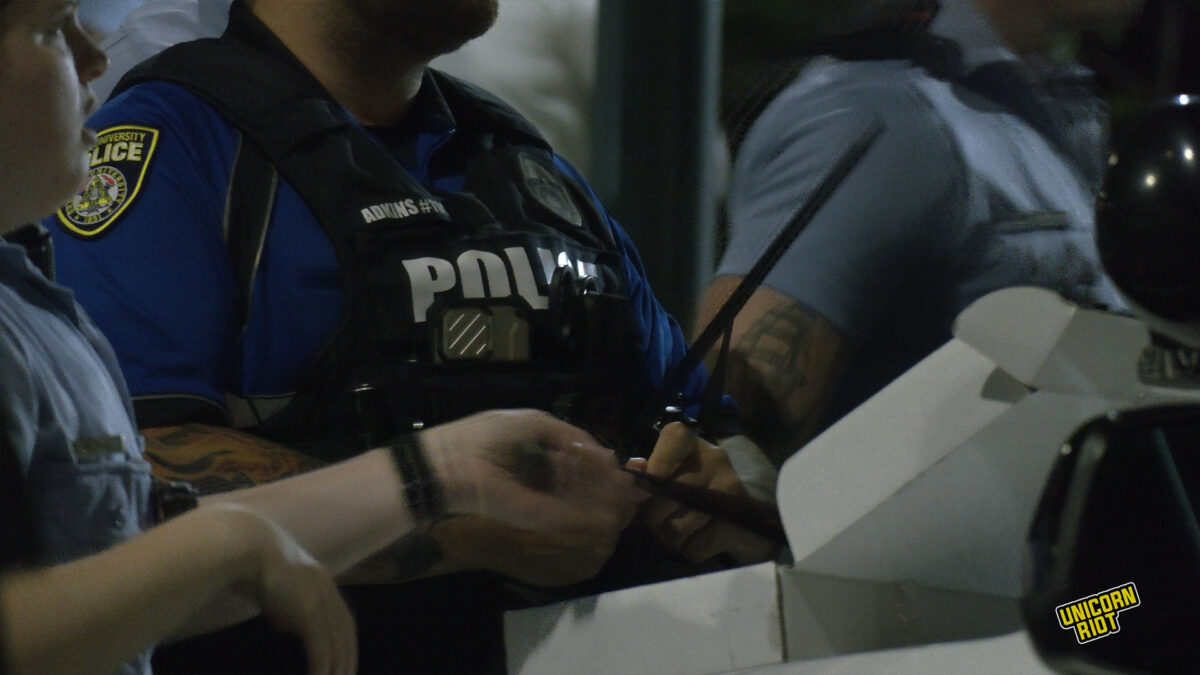
Unicorn Riot heard from one demonstrator that an international student was barred from their dorm room earlier without reasonable options to retrieve their possessions — similar to other tactics seen recently in other campuses.
As of May 9, six UPenn student organizers were put on mandatory leaves of absence. We also heard that more recent disciplinary messages had just been sent out which might have chilled participation on Friday night.

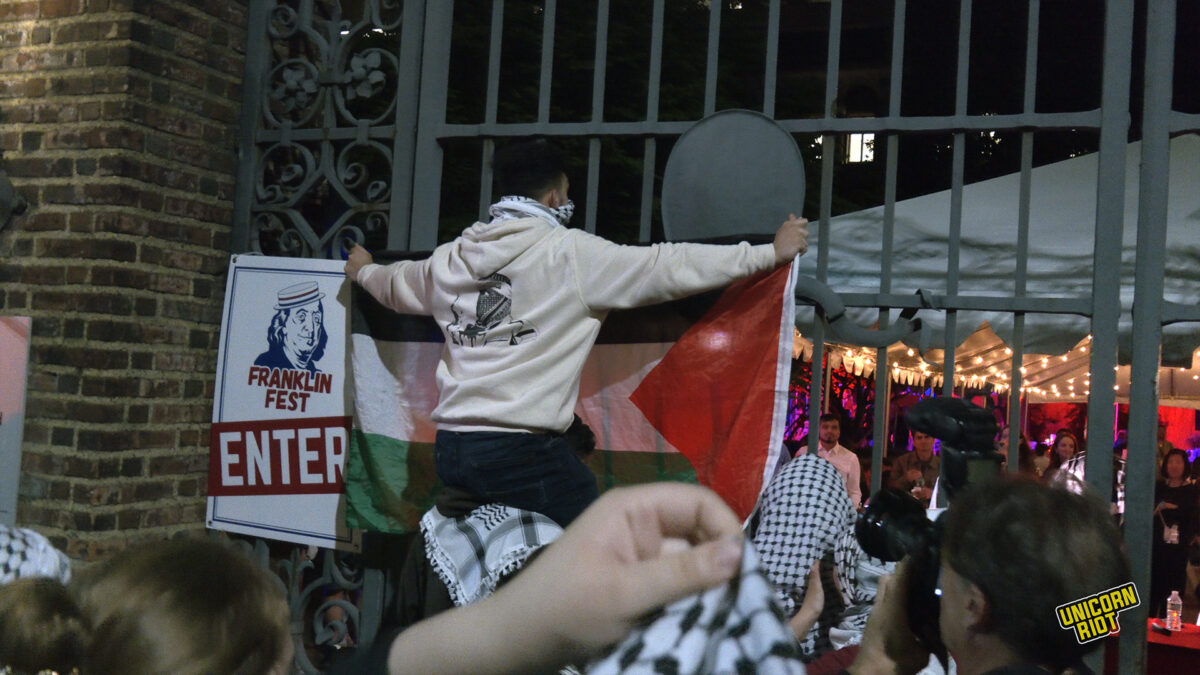
According to a series of updates by the Daily Pennsylvanian student paper, the alumni event was closed down around 11 p.m. after the protest encounter at the gate. Demonstrators dispersed and dozens headed to jail support to Philly police headquarters at 400 N. Broad Street.

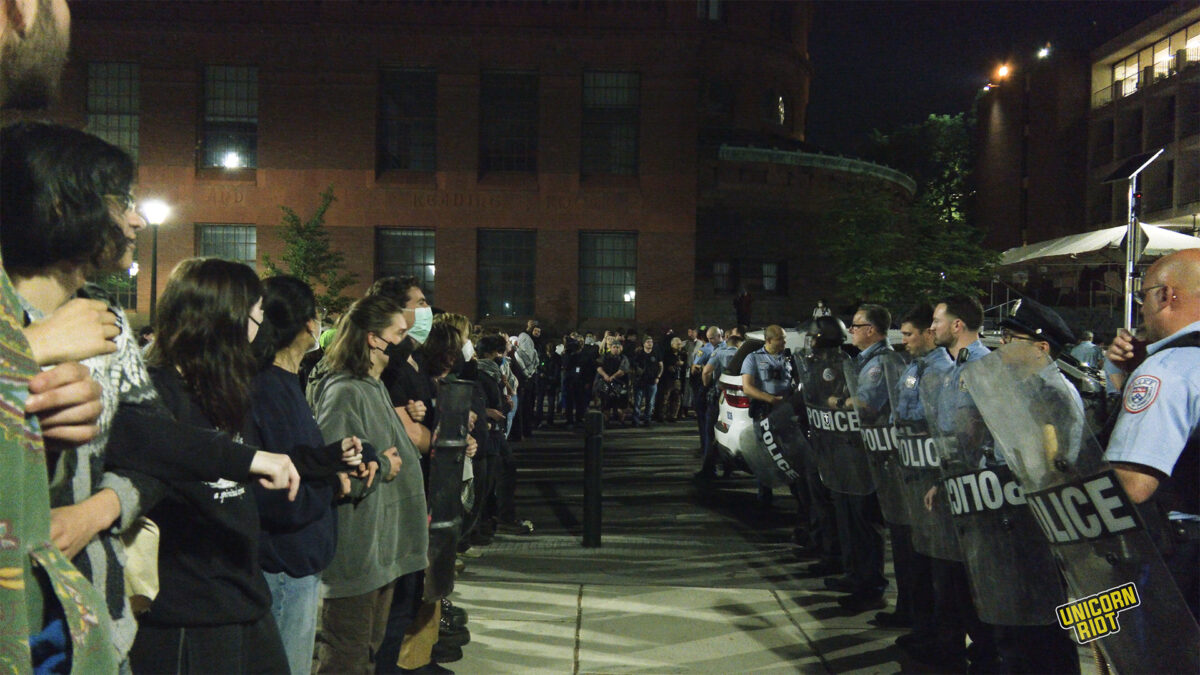
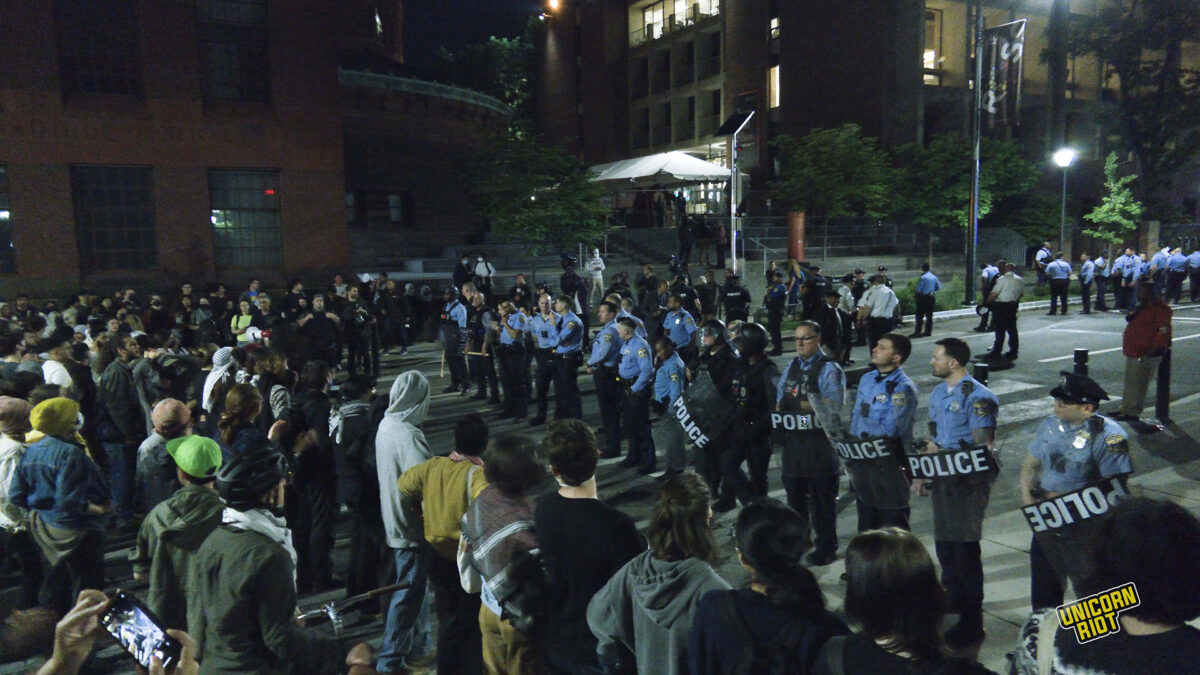
Social media clips and live video camera operation for the second half of the event by Chris Schiano.
For more from Palestine and pro-Palestine protests click on link below.